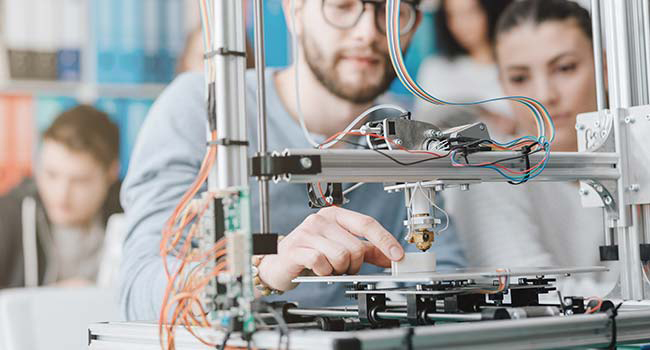UFV’s new Digital Manufacturing diploma addresses industry need for digital talent
With an eye to the future, the University of the Fraser Valley has announced an innovative new Digital Manufacturing program.
Starting in 2020, the diploma program will cover 3D modelling, 3D printing, Computer Numerical Controlled (CNC) machines, fabrication strategies, and much more.
Graduates will be able to work as operators, technicians, or technologists, either in digital manufacturing or any economic sector deploying technology.
“Gone are the days when any unskilled labourer could get a job at the local factory,” says John English, Dean of the Faculty of Applied and Technical Studies. “Nowadays, manufacturers are on the lookout for employees with a high-tech skill set.”
Students new to the field can start their first year in UFV’s Electronics Common Core Technician program in fall 2019 to meet the entrance requirements, while those already working in the electronics or manufacturing industry can meet entrance requirements by demonstrating an equivalent set of competencies, either through a portfolio, a prior recognized credential, or an individual assessment of prior learning.
According to a recent study by Deloitte and the Manufacturing Institute, computer skills, problem solving skills, technical training, and mathematical skills top the wish list of hiring managers at manufacturing companies.
Positions most affected by this human resource shortage are in skilled production, including machinists, operators, and technicians.
“We developed UFV’s new Digital Manufacturing diploma to prepare learners to use digital-based equipment, methods, techniques, and materials on the shop floor,” says English. “Consultation with local manufacturers confirmed that offering this program would serve a need in our region.”
B.C.’s manufacturing sector is the fourth largest in Canada. In the Fraser Valley, according to City of Abbotsford Economic Development, manufacturing supports 12,000 firms and 400,000 jobs. Digitization in the sector is driving growth by reducing costs, improving productivity, and sparking innovation.
“The diploma is excellent preparation for young people looking to acquire qualifications that will help them future-proof their career,” English adds. “It is also well suited to fabricators and machinists who’ve been working in manufacturing and want to beef up their digital skills.”
“The Digital Manufacturing program will provide students with lots of opportunities for hands-on work,” says Avner Bachar, assistant professor in the Automation and Robotics and Digital Manufacturing programs.
“The Trades and Technology Centre in Chilliwack is well equipped. We have digital and computer numerical controlled machinery, 3D printers, laser cutters, plasma cutters, automated looms, embroidery machines, and even pastry and culinary equipment. And in their last semester, students will get to complete a design and implementation project that they can gear toward their own interests and career goals.”
According to Bachar, there’s substantial room for innovation right now in the manufacturing industry.
“The training we’re offering opens up a lot of opportunities.”





